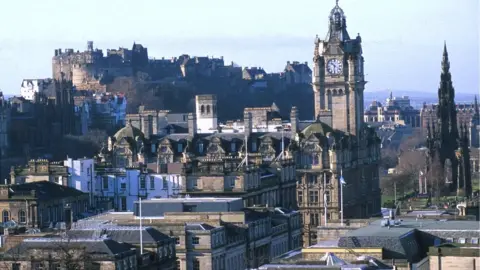Edinburgh could be 'short term let control area'
 BBC
BBCEdinburgh could be designated as a "short-term let control area" to safeguard residential homes.
It comes amid ideas for the city to be put to the public to help tackle climate change and protect communities through the planning system.
City of Edinburgh Council has published choices it could take when it draws up its City Plan 2030.
The proposals are subject to an eight-week statutory consultation if agreed by its planning committee next week.
The council has a commitment to become carbon neutral in the next 10 years.
One choice to be put to the public is to potentially designate the entire city or parts of it as a "short term let control area", which would mean "planning permission will always be required for the change of use of whole properties for short-term lets", under new rules being introduced by the Scottish government.
The council believes there are 14,000 Airbnb listings in the capital - while the Scottish government has announced that local authorities will be able to licence short term lets by spring 2021.
The authority has always maintained an ambition to cap the number of short term lets in certain parts of the city.
Green belt
Additional green belt land could be released to accelerate the number of new homes being delivered in the capital.
However, council officials have warned that their preferred option would be be use brownfield options instead.
Despite the brownfield option delivering 17,400 new homes compared to the 27,900 with green belt release, officials stress enough housing will be provided through either option or a blended choice.
If the preferred brownfield option is backed, the document warns the authority may "need to intervene to deliver 275 hectares of employment land for mixed redevelopment" and the approach "may require a significant compulsory purchase order programme to ensure land comes forward".
Another choice being put to the public is to "ensure we create places that focus on people not cars and prioritise public transport, walking and cycling to encourage active and healthy lives".
If backed by the public, "development must be well served by existing or planned new public transport, walking and cycling infrastructure".
The document also points to a choice that would "protect against the development of additional car parking in the city centre to support the delivery of the council's city centre transformation programme", which would see cars treated "as guests".
The council could decide "to determine parking levels in development based on targets for trips by walking, cycling and public transport."
Student housing
The city plan choices document points to overhauling its rules regarding purpose-built student housing - requiring developers to provide more housing and affordable housing for schemes over a certain size.
The documents highlights that student developments may have to be "built for and managed by" one of Edinburgh's universities or colleges and cap the amount of studio flats at 10% - so they can be easily converted to residential housing in the future, if required.
A choice in the new document could be to require developers bringing forward plans over a certain size to provide 35% of the units as on-site affordable housing. Currently, the level is set at 25%.
One choice being put forward by the council is to "require all buildings and conversions to meet the zero carbon/platinum standards a set out in the current Scottish building regulations".
If taken forward, developers will need to "demonstrate how their design will incorporate measures to tackle and adapt to climate change".
Neil Gardiner, City of Edinburgh Council's planning convener, said: "We need to have an open conversation with our residents, businesses and other stakeholders about how our city grows and changes to meet future needs where this growth takes place.
"We're embarking on one of the most significant periods of transformation in a generation and we need to rethink the way we expand to accommodate our growing population."
